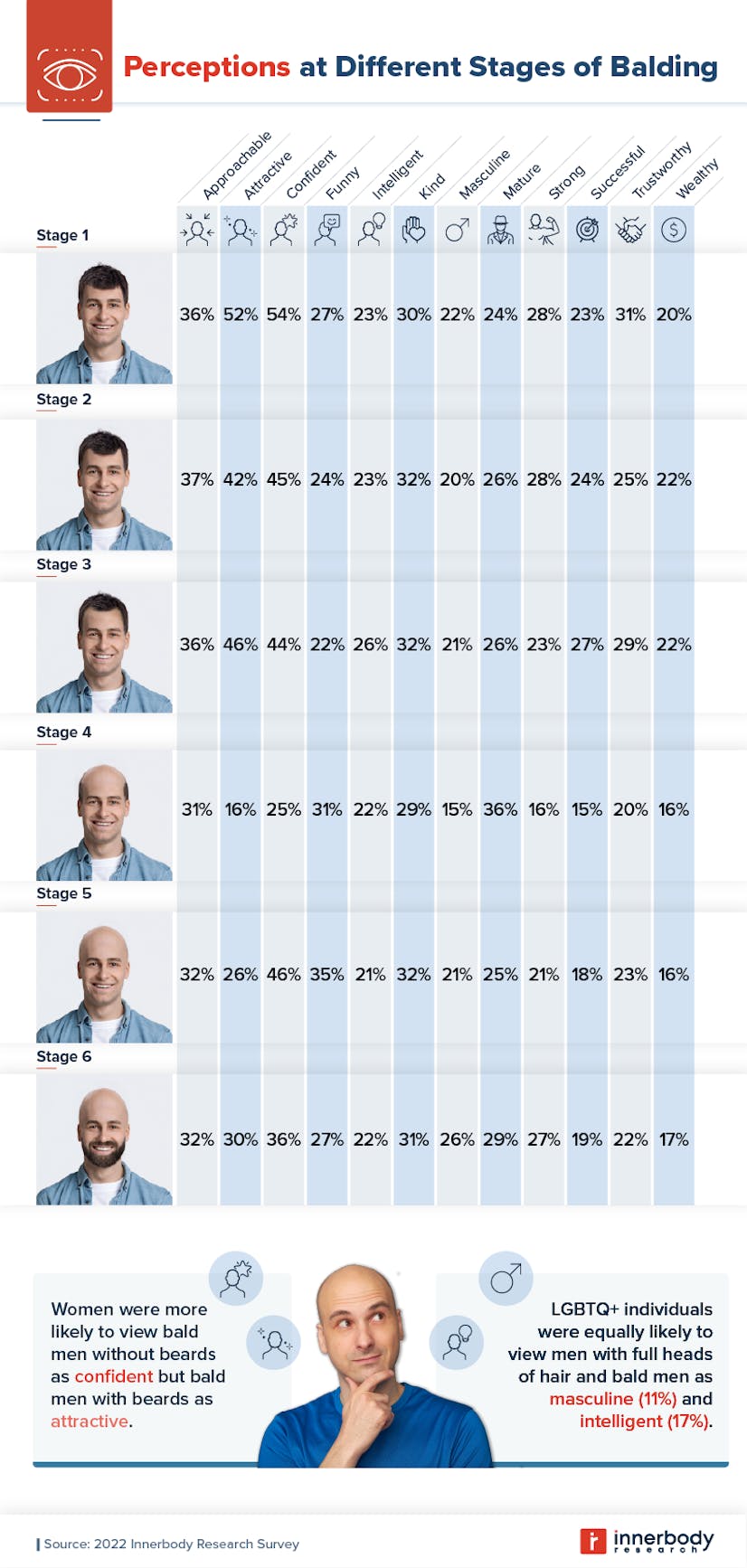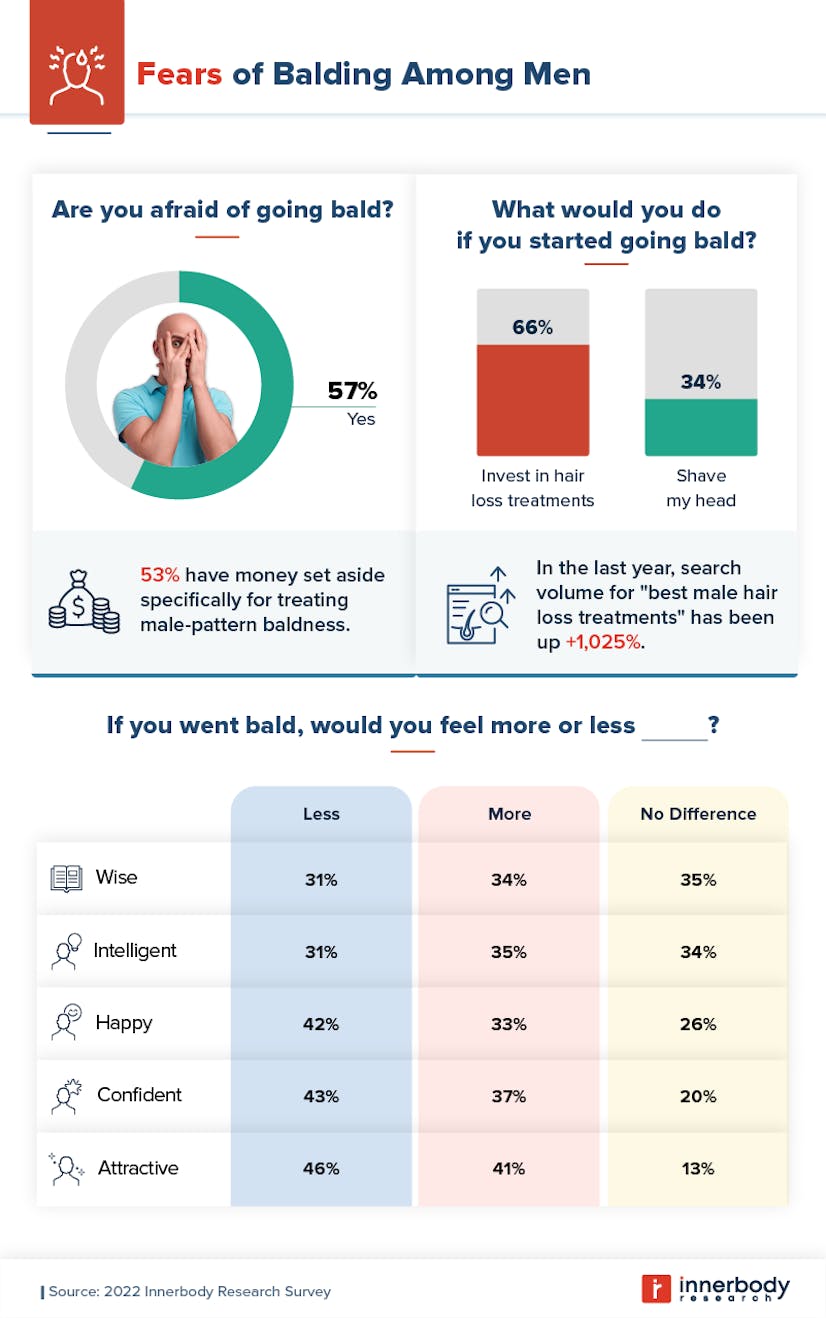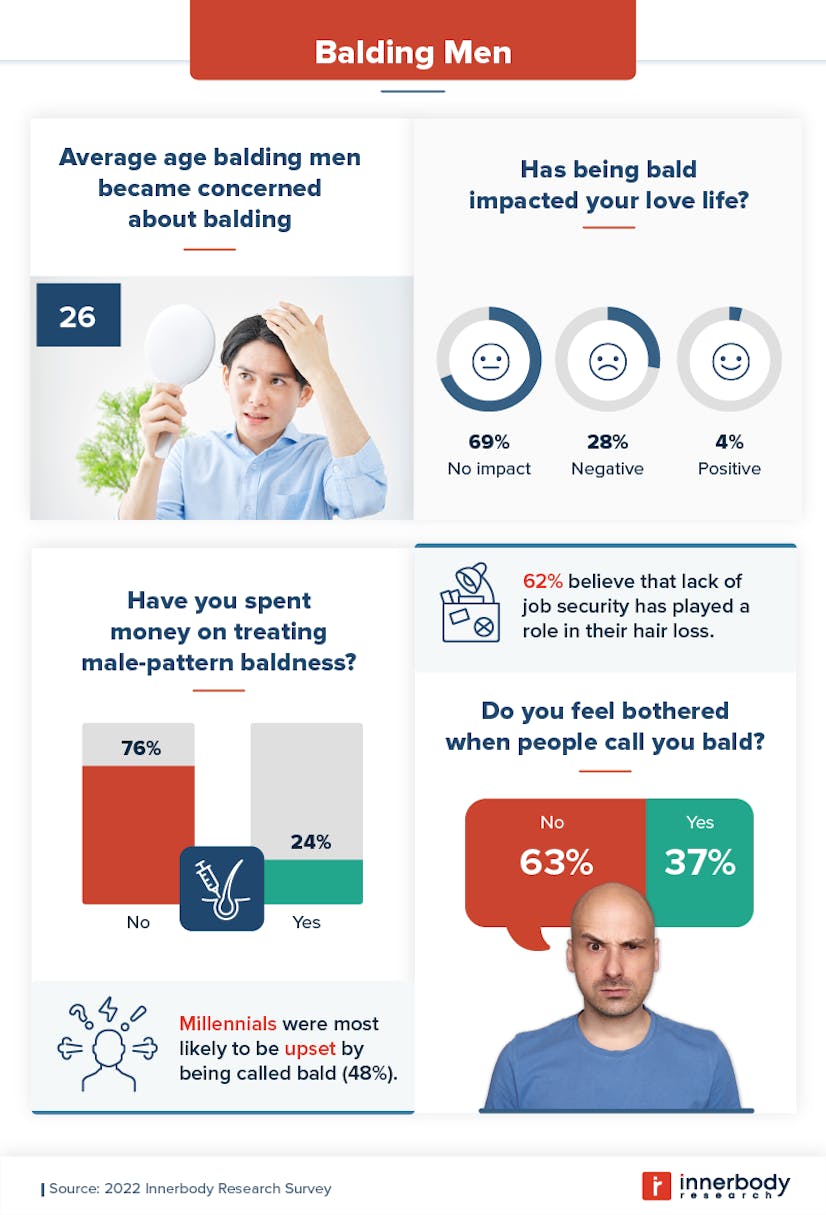Perception of Chrome Domes in the U.S.
Based on our survey, 51% believe calling someone bald should be considered sexual harassment.

By age 50, 85% of men will start to lose their hair. Despite how common the phenomenon of male-pattern baldness is, the way hair loss impacts a person's life varies from person to person. How might it affect their chances of landing a job? Will it hurt their self-esteem? Are bald men less attractive? This new study will reveal the answers to all these questions.
We spoke to more than 1,000 Americans of all ages, sexual orientations, and degrees of baldness to better understand how hair loss impacts men's lives. We found room for growth and change in the country's perception of baldness, but if you're curious to know how your head of hair — or lack thereof — might impact your life, keep reading.
Jump to:
Key takeaways
- Women were more likely to view bald men without beards as confident but bald men with beards as attractive.
- Men with receding hairlines were 13% more likely than men with full heads of hair to be viewed as intelligent.
- Search volume for "best male hair loss treatments" has been up +1,025% in the last year.
- 69% of balding men believe their hair loss has had no impact on their love life.
How Americans view baldness
Americans are known for being obsessed with perfection, some to the point of self-harm. But the way they feel about balding may pleasantly surprise you. In the first part of our study, we used an A/B test format in which each participant saw different images of men at varying stages of baldness. Then, we asked them to rate the men on perceived attractiveness, intelligence, humor, and more.

Photo by Innerbody Research
Men with receding hairlines were 17% more likely than men with full heads of hair to be considered successful. They were also 13% more likely to be viewed as intelligent. These findings are possibly due to a perceived increase in age. It's often assumed that older people enjoy more advanced careers and higher levels of intelligence and success. Intelligence can peak at any age, but our participants regularly connected it to men with less hair.
People in the LGBTQ+ community and straight individuals were equally likely to find bald men without beards attractive (26%). However, bearded bald men were 15% more likely than beardless bald men to be considered attractive. Additionally, women were a staggering 65% more likely to perceive bald men with beards as strong versus bald men with no facial hair. Women were also 13% more likely to view bald men with beards as wealthy and successful than those without facial hair.
Balding seems to be garnering increasing appeal, especially among the younger generations. Gen Z most commonly found baldness attractive in a man, while millennials were most likely to view bald men as confident. Since many consider confidence to be more attractive than any physical trait, maybe those findings will give yours a boost.
Respondents thought Dwayne "The Rock" Johnson (25%), Jason Statham (17%), and Vin Diesel (10%) to be the best-looking bald men. But you needn't be as muscular as The Rock to make a great impression. We found that less hair equaled a higher perception of a sense of humor: bald men were 30% likelier to seem funny to respondents.
Male pattern fears of going bald
Even though some respondents expressed an affinity for bald and balding men, hair loss fears among men were still highly prevalent. This piece of research digs into the specific worries shared by the men we surveyed, along with their intended courses of action.

Photo by Innerbody Research
Most men admitted that they're afraid of going bald. According to our results, those who haven't experienced hair loss yet began to worry about it around age 32. The greatest concern for 46% was that they would feel less attractive without hair. And while many have attributed positive perceived traits to men with less than a full head of hair, 43% of men still felt their confidence would go down if they lost theirs.
Perhaps this explains why two-thirds of men plan to invest in hair loss treatments if balding begins. A popular hair loss treatment like Rogaine costs between $40 and $50 for a three-month supply, while hair transplants cost up to $15,000. More than half of those surveyed have already set money aside for treatment.
It's important to note that this is a clear example of how society tends to profit off personal insecurities.

Photo by Innerbody Research
More than 60% of men blamed their hair loss on their lack of job security. This could be because millions of Americans lost their jobs during the beginning of the pandemic. Or possibly they're facing similar uncertainty now that we may be heading into a recession. Whatever the source, stress can take a toll on one's body and lead to hair loss and other difficulties like mood disorders, poor sleep, or digestive issues.
Fortunately for our bald male respondents, their hair loss experience wasn't as bad as they feared. Only one-quarter of balding respondents pursued treatment for their hair loss, and the majority (69%) agreed that hair loss had no impact on their love lives. Many LGBTQ+ individuals said that balding impacted theirs positively, although straight men were less likely to say the same. The youngest respondents seemed the least concerned about balding (Gen Z largely looked forward to feeling more attractive and confident as a result of going bald), and most men overall said that being called "bald" didn't bother them at all (63%).
Talking about baldness
Although bald respondents generally agreed they were unbothered by being referred to as such, there were some important nuances to this type of name-calling we want to unpack. In the last part of our study, we asked respondents to share their opinions on the act of calling and being called bald.

Photo by Innerbody Research
We asked respondents if they felt that calling someone bald should be considered sexual harassment. More than half of all respondents — bald or not — agreed that calling someone bald fits the bill.
Whether or not you agree with that statement, consider that baldness may be viewed as more common for men than women, so some people may consider it to be a gender-specific slight. Specifically, people in the LGBTQ+ community were 71% more likely than straight people to think calling someone bald was a form of sexual harassment. This community may have a more heightened awareness of gender-based discrimination as they face more discrimination and judgment than straight people.
Calling people bald also had a noticeable impact on how respondents lived their lives. Nearly two-thirds of respondents (64%) said they would be more likely to try a hair loss treatment if someone called them bald. However, pointing out hair loss was generally seen as less inappropriate than calling someone bald, probably because some level of hair loss is highly common, and caused by a number of reasons that can affect anyone.
Discussing hair loss without being offensive is a slippery slope that requires some tact. When in doubt, it's probably best to keep comments about people's appearance to yourself.
Balding gracefully
Balding might not be as bad as men expect it to be. Although respondents generally expressed fear and concern about the prospect of going bald, those who were already bald rarely noticed an impact on their lives. The general public often perceived those with receding hairlines or bald heads as kinder, funnier, and more successful. Gen Z Americans frequently found them more physically attractive as well.
Despite the many positive perceptions of losing hair, most respondents didn't want people calling them bald. This behavior may lead people to seek medical solutions when they might not have otherwise, and many even equate it with sexual harassment. At the end of the day, all types of shapes, sizes, and hairlines deserve love and respect.
Methodology
Innerbody Research surveyed 1,100 individuals about their perceptions surrounding male-pattern balding. Respondents ranged in age from 18 to 76. By gender, 73% were male, and 27% were female. Out of our male respondents, 10% self-identified as bald or balding. As for sexual orientation, 69% identified as straight, and 31% identified as LGBTQ. By generation, respondents were 16% Gen Z, 56% millennials, 20% Gen X, and 8% baby boomers. However, we didn't include baby boomer responses in our data report due to an insufficient sample size.
This sample size contained a margin of error of +/-3% with a 95% confidence level. To help ensure accurate data, we required all respondents to identify and correctly answer a decoyed attention check question. Survey data has certain limitations related to self-reporting. These limitations include telescoping, exaggeration, and selective memory.
About Innerbody Research
Innerbody Research helps guide people with copious research and trustworthy resources to make informed health-related decisions. For the past two decades, we’ve helped over 100 million people on the path toward better health and wellness.
Fair Use Statement
Going bald doesn't have to be scary. A bit of knowledge goes a long way. If you know someone who would benefit from this research, you're welcome to share it with them. Just be sure your purposes are noncommercial and that you link back to this page.


